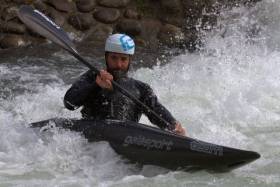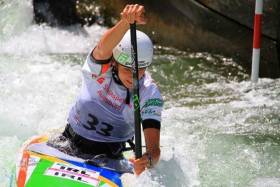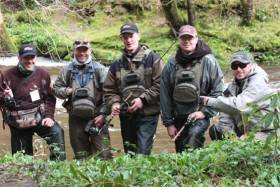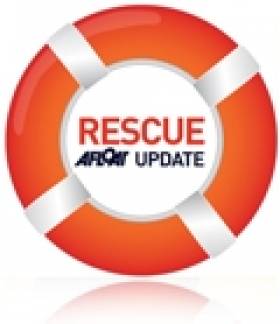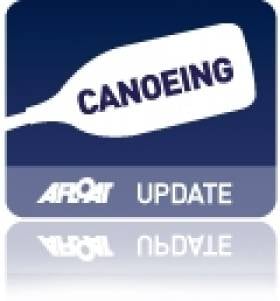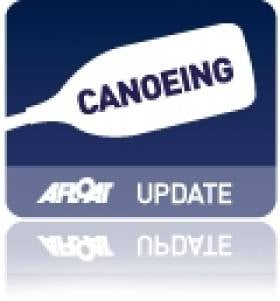Displaying items by tag: Slovakia
Heurteau Misses Chance of Olympic Qualification
#Canoeing: Ciarán Heurteau finished 16th in his second run of the K1 at the European Championships in Slovakia and missed out on a place in the semi-final, and the possibility of claiming a place at the Olympics. Heurteau had a poor first run, missing gate seven and incurring a 50-second penalty. His second-run time of 100.52 seconds was much better, but he would have had to finish in the top 10 to progress. Elliott Davidson placed 58th and 20th in his two runs.
Liam Jegou Qualifies for European Semi-Finals
#Canoeing: Liam Jegou qualified for the semi-finals of the canoe slalom European Championships in Liptovsky Mikulas in Slovakia this morning. A second run of 98.33 seconds with no touches put the 20-year-old through in the C1 category. His first run of 105.36, with a two-second penalty on gate six, had placed him 29th and eight places outside qualification, but his second run was much better. If Jegou can do well enough in the succeeding rounds so that his boat is the first from a country not already qualified for the Olympic Games, he will secure a place in Rio de Janeiro.
#Angling - The National Coarse Fishing Federation of Ireland (NCFFI) has announced the team to represent Ireland at the 14th World Championships for Bank Fishing with Lures.
The event, hosted in 2015 by the NCFFI on Craigavon Lakes, will this year take place on the River Poprad in Slovakia in May.
Tomasz Kurman will manage and captain the team that includes Jacek Gorny, Colin Rutherford, Lindsay McFadden, Andrew Powell and reserve David Dennis, with Steven Powell as delegate.
The angling team was chosen through a process of qualifiers over the weekend of 2-3 April on the River Cusher in Co Armagh, chosen in order to replicate as much as possible the conditions to be expected in Slovakia.
Unfortunately the river was in full flood and very fast flowing but it highlighted the specific skills of the anglers who need to be able to deal with all conditions.
Kurman commented: “I am pleased to say that after a tough qualification process on a flooded and very fast flowing River Cusher, we were able to form a strong motivated team, eager to mark their position on the world stage for Ireland alongside the best lure anglers in the world.
"In addition I would like to make a specific mention of three anglers who put up a great fight during the qualifiers, namely Arvydas Mencinskas, Cristian Cacovean and Guntars Vaivads who finished with 66.5 points and in joint fifth place alongside David Dennis and Andrew Powell, all having caught the one fish during the qualifiers.
"Andrew was selected for the final position on the team as his fish was caught during Leg 6 when no other angler caught. Due to FIPS-ed passport eligibility restrictions and the fact that David Dennis represented us in 2014 he was chosen as the reserve. Along with Steven Powell who travels as team delegate their previous experience of world championship events will be invaluable to us on the bank.
"Thank you to all competitors who entered the qualifiers, our members and stewards who made it a flawless event, DCAL Fisheries and Armagh City, Banbridge & Craigavon Borough Council I would also like to take this opportunity to thank the team sponsors Vass Waders & Rainwear and Main Irish Angling along the NCFFI for their continued support.”
The NCFFI, a voluntary body, is a member of the Angling Council of Ireland and is the national governing body for coarse and predator angling recognised by Sport Ireland and Sport Northern Ireland.
Search Scaled Down for Missing Crewman in Irish Sea
#RESCUE - BBC News reports that the search for a cargo ship crewman missing in the Irish Sea has been scaled down.
The 22-year-old from Slovakia was reported missing yesterday morning from the Fehn Sirius, which was en route from Belfast to Portugal, as it headed past Arklow, Co Wicklow.
According to The Irish Times, he was last seen on the cargo ship around 10pm on Monday night as it headed south of the entrance to Strangford Lough.
Lifeboats from Portaferry and Newcastle in Northern Ireland and Arklow joined the search and rescue operation, which was assisted by the RAF helicopter based at Prestwick in Scotland and an Irish Coast Guard helicopter.
However, most rescue services have now been stood down as the Fehn Sirius continues to backtrack in the Irish Sea, with assistance from the Naval Service vessel LE Ciara.
Only three days ago the body of another mariner was recovered from the Irish Sea off the north Dublin coast, more than a month after he went missing.
Five Represent Ireland at Canoe Slalom World Cup
Eoin Rheinisch joins four others representing Ireland at the Canoe Slalom World Cup today.
Ciarán Heurteau, Patrick Hynes, Hannah Craig and Aisling Conlan round out the squad competing in Leipzig, Germany.
Rheinisch told The Irish Times that he was "shattered" after a week of hard training in Bratislava, aiming for the World Championships and Olympic qualification there in September.
"But they are the kind of sessions I need to be getting intermittently,” he said.
Rheinisch Back in the Paddle
Olympic kayaker Eoin Rheinisch was back in canoe action in Spain recently for the first time after a shoulder operation last year.
The Irish Times reports that Rheinisch, who had surgery on his left shoulder last November, placed 34th in the canoe slalom European Championships at Seu d’Urgell.
The Kildare native confirmed that his fitness has not fully returned, but is getting better "day by day".
"The real goal is to get the high-intensity fitness back,” he said.
Rheinisch has four more events on the calendar before the World Championships and Olympic qualifiers in Slovakia this September.


























